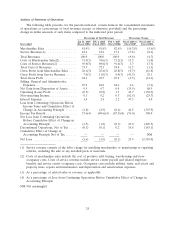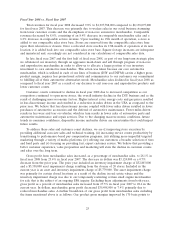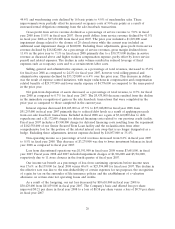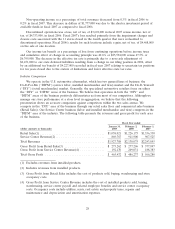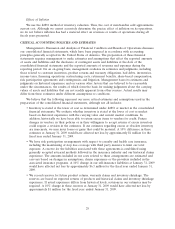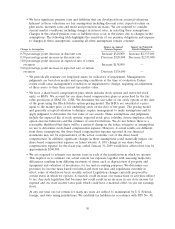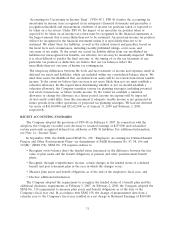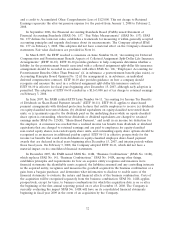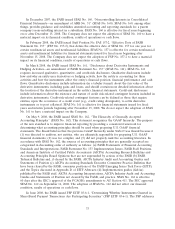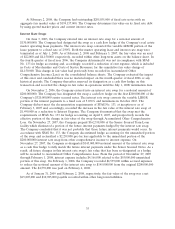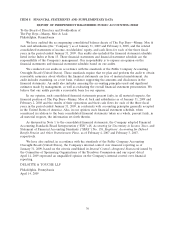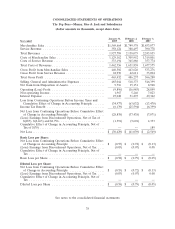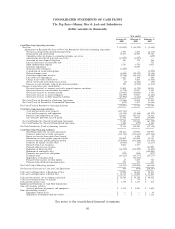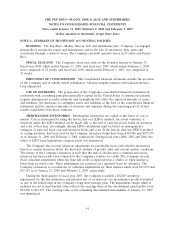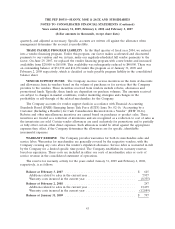Pep Boys 2008 Annual Report Download - page 97
Download and view the complete annual report
Please find page 97 of the 2008 Pep Boys annual report below. You can navigate through the pages in the report by either clicking on the pages listed below, or by using the keyword search tool below to find specific information within the annual report.In December 2007, the FASB issued SFAS No. 160, ‘‘Noncontrolling Interests in Consolidated
Financial Statements—an amendment of ARB No. 51’’ (SFAS No. 160). SFAS No. 160, among other
things, provides guidance and establishes amended accounting and reporting standards for a parent
company’s noncontrolling interest in a subsidiary. SFAS No. 160 is effective for fiscal years beginning
on or after December 15, 2008. The Company does not expect the adoption of SFAS No. 160 to have a
material impact on its financial condition, results of operations or cash flows.
In February 2008, the FASB issued Staff Position No. FAS 157-2, ‘‘Effective Date of FASB
Statement No. 157’’ (FSP No. 157-2), that defers the effective date of SFAS No. 157 for one year for
certain nonfinancial assets and nonfinancial liabilities. SFAS No. 157 is effective for certain nonfinancial
assets and nonfinancial liabilities for financial statements issued for fiscal years beginning after
November 15, 2008. The Company does not expect the adoption of FSP No. 157-2 to have a material
impact on its financial condition, results of operations or cash flows.
In March 2008, the FASB issued SFAS No. 161, ‘‘Disclosures about Derivative Instruments and
Hedging Activities—an amendment of FASB Statement No. 133’’ (SFAS No. 161). SFAS No. 161
requires increased qualitative, quantitative, and credit-risk disclosures. Qualitative disclosures include
how and why an entity uses derivatives or hedging activity, how the entity is accounting for these
activities and how the instruments affect the entity’s financial position, financial performance and cash
flows. Quantitative disclosures include information (in a tabular format) about the fair value of the
derivative instruments, including gains and losses, and should contain more detailed information about
the location of the derivative instrument in the entity’s financial statements. Credit-risk disclosures
include information about the existence and nature of credit risk-related contingent features included in
derivative instruments. Credit-risk-related contingent features can be defined as those that require
entities, upon the occurrence of a credit event (e.g., credit rating downgrade), to settle derivative
instruments or to post collateral. SFAS No. 161 is effective for financial statements issued for fiscal
years and interim periods beginning after November 15, 2008. We do not expect the adoption of SFAS
No. 161 to have a material impact on the Company.
On May 9, 2008, the FASB issued SFAS No. 162, ‘‘The Hierarchy of Generally Accepted
Accounting Principles’’ (SFAS No. 162). This statement reorganizes the GAAP hierarchy. The purpose
of the new standard is to improve financial reporting by providing a consistent framework for
determining what accounting principles should be used when preparing U.S. GAAP financial
statements. The Board believes that the previous GAAP hierarchy under SAS 69 was flawed because it
(1) was directed to auditors, not entities, who are ultimately responsible for preparing U.S. GAAP
financial statements; (2) was too complex; and (3) did not properly rank the accounting literature. In
accordance with SFAS No. 162, the sources of accounting principles that are generally accepted are
categorized in descending order of authority as follows: (a) FASB Statements of Financial Accounting
Standards and Interpretations, FASB Statement No. 133 Implementation Issues, FASB Staff Positions,
and American Institute of Certified Public Accountants (AICPA) Accounting Research Bulletins and
Accounting Principles Board Opinions that are not superseded by actions of the FASB (b) FASB
Technical Bulletins and, if cleared by the FASB, AICPA Industry Audit and Accounting Guides and
Statements of Position (c) AICPA Accounting Standards Executive Committee Practice Bulletins that
have been cleared by the FASB, consensus positions of the FASB Emerging Issues Task Force (EITF),
and the Topics discussed in Appendix D of EITF Abstracts (d) Implementation guides (Q&As)
published by the FASB staff, AICPA Accounting Interpretations, AICPA Industry Audit and Accounting
Guides and Statements of Position not cleared by the FASB, and practice. SFAS No. 162 is effective
60 days after the SEC’s approval of the PCAOB’s amendments to AU Section 411. The SEC approved
SFAS No. 162 on September 16, 2008. The adoption of SFAS No. 162 did not affect our financial
condition, results of operations or cash flows.
In June 2008, the FASB issued FSP EITF 03-6-1, ‘‘Determining Whether Instruments Granted in
Share-Based Payment Transactions Are Participating Securities’’ (FSP EITF 03-6-1). The FSP addresses
33



